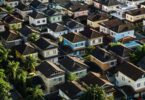By Angie Ye
Boston University News Service
BOSTON – Mayor Michelle Wu’s election win earlier this month is being seen by some in the Asian American community as a call of encouragement when it comes to political engagement.
Wu, the daughter of Taiwanese immigrants, became the first person of color and first woman to be elected mayor of Boston, ending Boston’s record of electing mostly Irish or Italian American men since the 1930s.
“It means so much to Chinese Americans,” Hua Wang, a Boston University engineering professor, said at Wu’s Election Night party. “We are witnessing a historical moment tonight.”
Wang said that Wu’s victory is an inspiration to the next generation of Asian Americans, breaking the political ceiling for younger Asian Americans, who contribute to the region’s economy, culture, and high-technology sectors while remaining inactive in politics.
Asian Americans have been the fastest-growing ethnic group in the U.S. for at least two decades, with their share of the population growing by 81% between 2000 and 2019, from about 10.5 million to a record 18.9 million, according to a Pew Research Center analysis of U.S. Census Bureau population estimates.
In Boston, the Asian population increased from 55,235 in 2010 to nearly 67,182, or 9.7% of the population, in 2020.
Nationally, Asian Americans and Pacific Islanders have also played a part within the progressive voters of color coalition, voting for Joe Biden over Donald Trump by a margin of 68% to 28% during the 2020 U.S. presidential election, according to the 2020 American Election Eve Poll by the AAPI Civic Engagement Fund and 21 ally organizations.
However, some serious structural obstacles, especially language barriers, still exist for Asian American and Pacific Islander voters casting ballots. Asian Americans have still been underrepresented in politics in Massachusetts and across the country.
A report from the Reflective Democracy Campaign shows an extreme underrepresentation in elected office among AAPI people, with 0.9% of U.S. elected leaders across all levels of government, but 6.1% of the population as of mid-2020.
Adding to that sense of isolation has been a spike in acts of violence and hate speech against Asian Americans during the COVID-19 pandemic.
Derogatory terms such as “Chinese virus,” “kung-flu” or “Asian virus” contributed to a 76% increase in hate crimes in 2020, according to the updated 2020 hate crime statistics released by the FBI.
“I’m very excited to witness this [victory of Wu’s election], especially after I saw the Asian American community has been attacked, victimized, and persecuted more than I know in my lifetime in the last year and a half,” said Leverett Wing, a political activist and chief executive officer at the Commonwealth Seminar, a privately-funded program aimed at opening the door of government to diverse leaders.
“To have her become the mayor is just one giant ray of hope that we can look at,” Wing said.
During her bid for mayor, Wu adopted a multilingual campaign strategy, which found an echo in many Asian Americans, including a simplified and traditional Chinese-subtitled YouTube video “Michelle for Mayor – Boston for Everyone.”
In the video, Wu tells her story of being the daughter of Taiwanese immigrants, her Asian cultural background, and shows her passion for building communities that are “healthy, safe, and resilient” in Boston.
Wu, 36, who speaks Mandarin and Spanish, said it has been inspiring to see voter participation and civic engagement within AAPI communities in Boston and elsewhere.
Wu was first elected to the Boston City Council in November 2013 when she was 28, becoming the first Asian American woman to serve on the council.
As a former law student of U.S. Sen. Elizabeth Warren, Wu worked on Warren’s first campaign in 2012. Warren endorsed Wu in the race to succeed former Mayor Martin J. Walsh in January 2021, calling her a “fighter.”
Her mayoral campaign also received a series of endorsements from prominent Bostonians, including Acting Mayor Kim Janey and U.S. Rep. Ayanna Pressley, a former Boston city councilor and a member of the Congress’ the “Squad” — a group of progressive House members.
The coalition created by Wu brought together white progressives and Black and Latino communities, but Asian Americans’ votes were another key factor to her victory.
“We organized so many fundraisers and translated campaign materials into Chinese for more Chinese residents to read. We did street canvassing every week. We had unlimited power for supporting her in the past year,” said Gary Yu, Chinese American outreach advisor of the Wu Committee.
Yu said without Chinese Americans’ support in her year-long campaign, there would be no Mandarin sentence — 这些都可以成为现实 (All of this is possible) — in Michelle Wu’s victory speech.
As one of the first organizations to endorse Wu last year, the New England Chinese American Alliance held three fundraisers earlier this year, raising over $120,000, according to Wang, who serves as a co-chair of the NECAA.
The September fundraising event expanded the fundraising scope from the Greater Boston area to more than 30 states across the country, NECAA wrote.
Yet, some Chinese residents in Boston still feel there are huge gaps for Asian Americans seeking political power.
David Li, the founder of bostonese.com, an English-Chinese Bilingual Online Journal, said Wu’s outreach to Black and Latino communities created hard feelings among some Asian Americans.
“This somewhat disappointed some Asian communities,” he said.
Asian Americans support Wu working to open more opportunities for Asian communities, but they feel they did not gain enough attention, according to Li.





